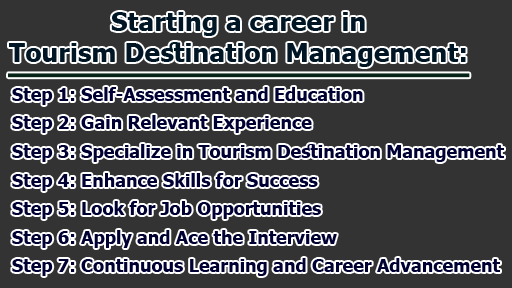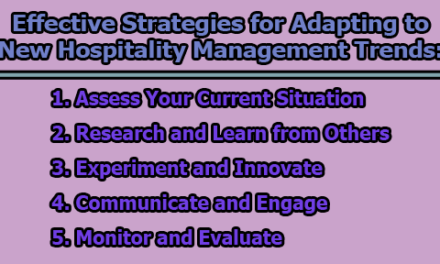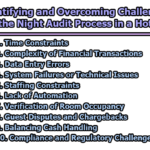Starting a Career in Tourism Destination Management:
Getting started in tourism management requires careful planning and preparation. It’s a diverse field with various career paths, so it’s essential to choose the area that aligns with your interests and strengths. Here’s a guide to help you begin your journey as a Tourism Destination Manager: starting a career in tourism destination management.
Step 1: Self-Assessment and Education:
- Self-Assessment: Take the time to thoroughly assess your interests, skills, and personal attributes. Ask yourself what aspects of tourism management excite you the most – is it the opportunity to promote a destination, the thrill of managing day-to-day operations, or the chance to interact with people from diverse backgrounds?
- Research Career Paths: Tourism management offers a wide range of career paths, including tourism destination management, hotel management, event management, and more. Research each area to determine which one aligns best with your passions and long-term goals.
- Education and Training: Depending on your chosen career path, consider pursuing relevant education and training. Look for accredited programs or courses in tourism management, hospitality, business administration, marketing, or event management. A bachelor’s degree in tourism or a related field can provide a strong foundation for your career.
Step 2: Gain Relevant Experience:
- Internships and Volunteering: Seek out internships or volunteer opportunities with tourism boards, hotels, resorts, or event management companies. Practical experience will allow you to apply theoretical knowledge, gain insights into the industry, and develop essential skills.
- Part-time Jobs: While pursuing your education, consider working part-time in hospitality or customer service roles. Jobs such as front desk staff, tour guide, or customer support at a travel agency can provide valuable experience and exposure to the industry.
Step 3: Specialize in Tourism Destination Management:
- Research the Role: Explore the specific responsibilities of a Tourism Destination Manager. This may include overseeing tourism marketing campaigns, managing tourist attractions, collaborating with local authorities, handling visitor inquiries, and ensuring the overall success of the destination.
- Networking: Attend industry events, seminars, and conferences related to tourism management. Networking with professionals in the field can lead to valuable connections, mentorship opportunities, and potential job openings.
Step 4: Enhance Skills for Success:
- Leadership and Communication: Develop strong leadership skills to guide your team effectively and foster a positive work environment. Effective communication is essential for interacting with staff, stakeholders, and tourists from different cultures and backgrounds.
- Problem-solving and Decision-making: As a Tourism Destination Manager, you’ll encounter various challenges. Practice critical thinking and decision-making to address issues promptly and find practical solutions.
- Cultural Awareness: Being sensitive to cultural differences is crucial when managing a tourism destination. Learn about local customs, traditions, and etiquette to ensure smooth interactions with both tourists and residents.
Step 5: Look for Job Opportunities:
- Job Portals: Regularly check online job portals and websites that specialize in tourism and hospitality careers. Look for positions specifically related to tourism destination management.
- Tourism Boards and Government Agencies: Tourism Destination Managers often work in collaboration with tourism boards and government agencies. Monitor their websites and career pages for any relevant job openings.
- Hospitality Industry: Consider opportunities in hotels, resorts, and travel agencies, as they often require professionals with expertise in tourism management to oversee their destination-related operations.
Step 6: Apply and Ace the Interview:
- Tailor Your CV and Cover Letter: Customize your CV and cover letter to highlight your skills, experience, and achievements relevant to the role of Tourism Destination Manager. Showcase your passion for the industry and your commitment to promoting destinations.
- Prepare for the Interview: Research the destination or organization you’re applying to. Familiarize yourself with its tourism offerings, target audience, recent marketing campaigns, and challenges. Be prepared to discuss your ideas and strategies for enhancing the destination’s appeal.
- Demonstrate Diplomacy and Problem-solving: During the interview, demonstrate your ability to handle challenging situations diplomatically and solve problems effectively. Provide examples of how you have successfully managed issues in previous roles or projects.
Step 7: Continuous Learning and Career Advancement:
- Continuing Education: Stay updated on industry trends, marketing techniques, and new technologies. Attend workshops, webinars, and conferences related to tourism and destination management to expand your knowledge and skill set.
- Seek Leadership Opportunities: As you gain experience in tourism destination management, seek opportunities to take on leadership roles or spearhead projects within your organization. This will demonstrate your initiative and potential for career advancement.
- Professional Certifications: Consider obtaining relevant certifications in tourism and destination management, such as Certified Destination Management Executive (CDME) or certifications from industry associations.
It is apparent that starting a career in Tourism Destination Management requires a combination of education, experience, and relevant skills. By choosing the right education, gaining practical experience, and continuously enhancing your skills, you can pave the way for a successful and rewarding career in the tourism industry. Additionally, networking, staying updated on industry trends, and demonstrating leadership qualities will contribute to your growth and success as a Tourism Destination Manager.
Frequently Asked Questions [FAQs]:
What is Tourism Destination Management?
Tourism Destination Management involves overseeing and coordinating all aspects of a tourist destination to ensure its success and attractiveness to visitors. It includes marketing the destination, managing tourist attractions, coordinating hospitality services, collaborating with local authorities, and addressing visitor inquiries and concerns.
What are the key responsibilities of a Tourism Destination Manager?
A Tourism Destination Manager is responsible for:
- Developing and implementing tourism marketing strategies to attract visitors.
- Ensuring the smooth functioning of tourist attractions and facilities.
- Collaborating with government agencies and stakeholders to enhance the destination’s appeal.
- Managing staff and ensuring excellent customer service.
- Monitoring visitor feedback and addressing any issues promptly.
- Conducting market research to identify tourism trends and competitor analysis.
What education and experience are required to become a Tourism Destination Manager?
While formal education in tourism or a related field is beneficial, some positions may require a bachelor’s degree or higher in tourism management, hospitality, business administration, or marketing. Relevant work experience in the tourism industry, particularly in leadership roles, is highly valuable.
How can I start my career as a Tourism Destination Manager?
To begin your career in Tourism Destination Management:
- Pursue relevant education and training in tourism or a related field.
- Gain practical experience through internships, part-time jobs, or volunteering in the tourism industry.
- Develop strong leadership, communication, and problem-solving skills.
- Look for entry-level positions in the tourism sector, such as assistant manager or coordinator roles.
- Network with industry professionals and seek mentorship opportunities.
What are the challenges faced by Tourism Destination Managers?
Tourism Destination Managers may encounter challenges such as:
- Balancing the needs of tourists with the preservation of the destination’s natural and cultural assets.
- Dealing with seasonality and fluctuating tourist demands.
- Managing tourism’s impact on the local community and environment.
- Addressing crises and emergencies effectively.
- Staying updated with industry trends and adapting to changing market demands.
How does tourism marketing play a role in Destination Management?
Tourism marketing is a crucial aspect of Destination Management as it aims to attract visitors and promote the destination’s unique offerings. Effective marketing strategies include digital campaigns, social media engagement, content creation, and collaboration with travel agencies. Tourism Destination Managers need to continuously assess market trends and target audience preferences to develop successful marketing initiatives.
Is cultural awareness important in Tourism Destination Management?
Yes, cultural awareness is vital in Tourism Destination Management. Being sensitive to cultural differences and customs is essential for providing a positive experience for both tourists and locals. Understanding and respecting the local culture can enhance visitor satisfaction, foster sustainable tourism practices, and avoid potential conflicts.
How can I advance my career as a Tourism Destination Manager?
To advance your career as a Tourism Destination Manager:
- Pursue advanced education or certifications in tourism management or related fields.
- Demonstrate strong leadership and decision-making skills.
- Seek opportunities to lead projects and initiatives within your organization.
- Stay updated with industry trends and innovations.
- Consider taking on roles with increased responsibilities, such as Regional Tourism Manager or Director of Destination Marketing.
Can I work as a Tourism Destination Manager in different countries?
Yes, the skills and knowledge of a Tourism Destination Manager are transferable across different countries and destinations. However, you may need to adapt to local regulations, cultures, and market demands in each new location.
What is the potential for career growth in Tourism Destination Management?
The tourism industry offers various opportunities for career growth. With experience and demonstrated success as a Tourism Destination Manager, you can advance to higher-level positions within destination management organizations, tourism boards, or hospitality companies. Additionally, you may have the chance to lead destination marketing campaigns on a regional or national level.

Former Student at Rajshahi University










